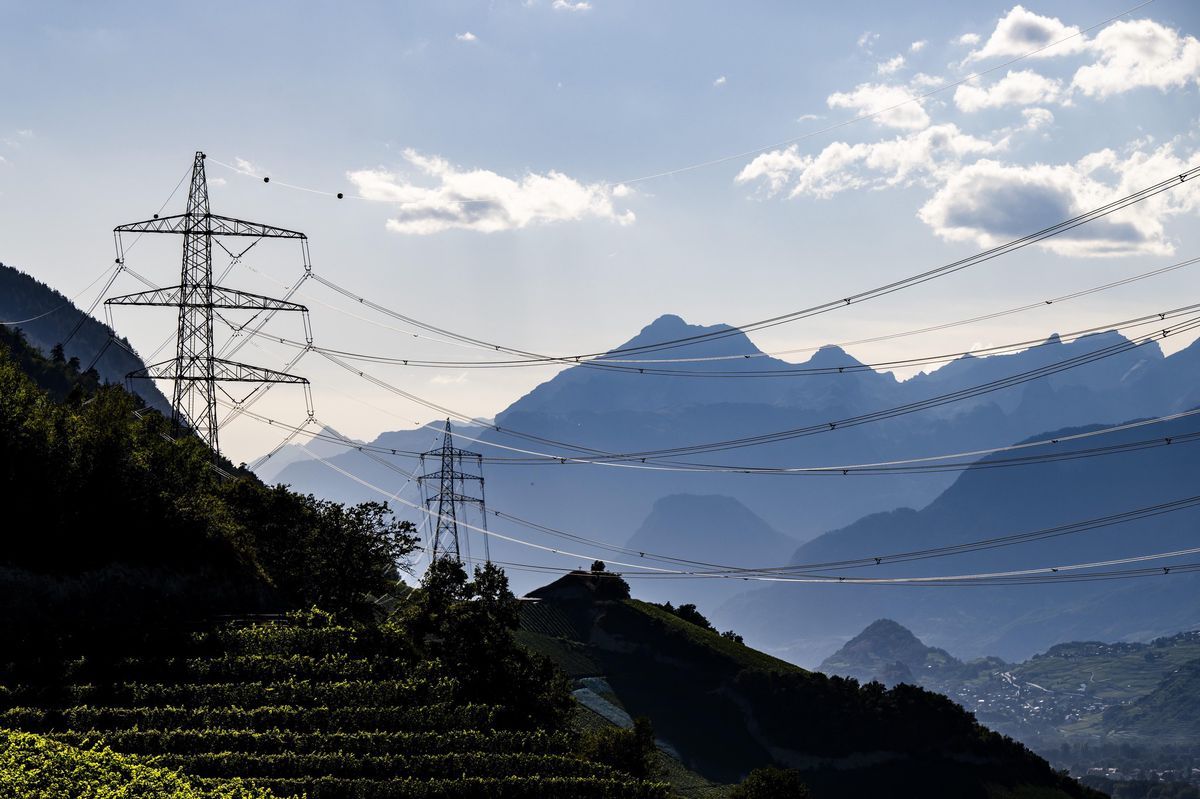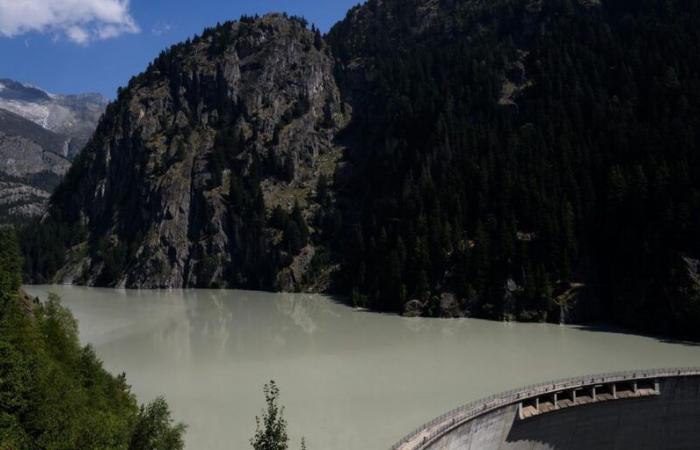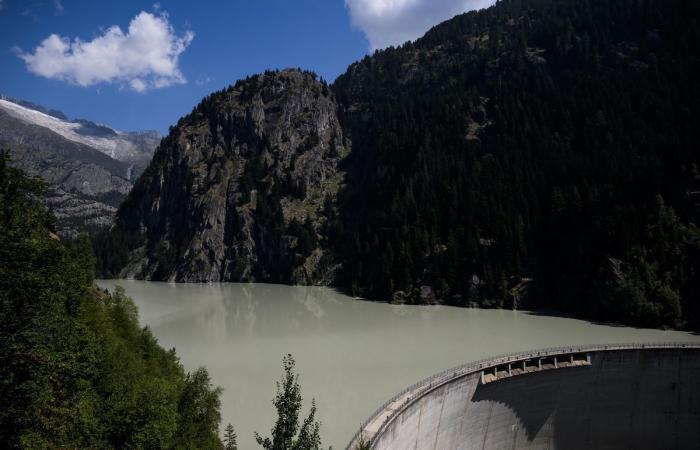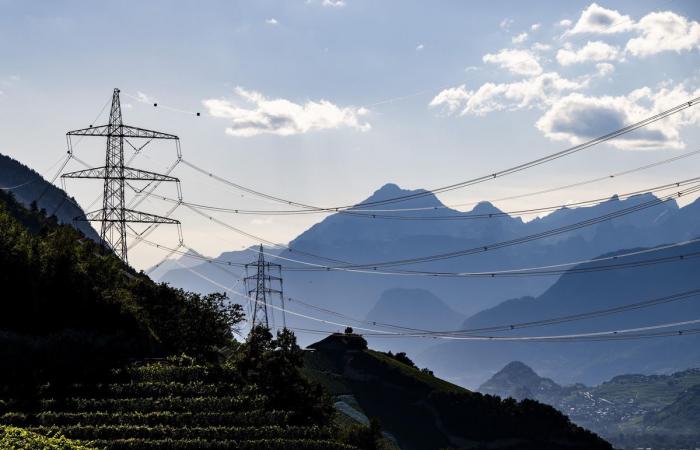ThoseElectricity in Europe –
In the absence of an agreement with the EU, Alpiq must tinker
The country’s second largest energy producer, the company opens its doors to emphasize the importance of an agreement with Brussels.
Published: 12/17/2024, 6:44 p.m.
With its numerous dams (here Gebidem in Haut-Valais), Switzerland offers flexibility to the European network. For energy producers, however, the absence of an agreement prevents them from fully playing this role.
KEYSTONE/Jean-Christophe Bott
Subscribe now and enjoy the audio playback feature.
BotTalk
- Switzerland plays a crucial role in the European electricity network.
- An agreement with the EU would facilitate cross-border energy trade.
- Alpiq underlines the economic and organizational interest of such an agreement.
- Refusing an agreement would lead to greater uncertainty for Switzerland.
In the room, a small shrill beep sounded. “What was that?” – “A critical alarm which requires us to adapt our settings on the Swiss electricity network”, responds with Olympian calm Romain Birbaum, responsible for network and system management at Alpiq. Behind him, an employee adjusts the situation with a few clicks. The scene recurs on average every quarter of an hour.
We are in the Alpiq electricity production management center in Lausanne. A quarter of Swiss electricity production is managed here, twenty-four hours a day, 365 days a year. Against the wall, a huge screen indicates the water level of the various dams, the production of the group’s hydroelectric power stations and that of its Gösgen nuclear installation. In the center, a number vacillates above and below zero: it is the live gap between consumption and production, and everything fits into this equation: the number must remain as stable as possible.
Switzerland is not an island
The day of the visit this Tuesday owes nothing to chance: Alpiq is organizing it to remind people of the crucial importance of an electricity agreement with the European Union. The latter is part of the Bilateral III package, whose negotiations are in the final sprint. Because it’s a fact: Switzerland is not an island, it is interconnected to the European electricity network. “It’s the largest machine in the world,” recalls Amédée Murisier, director of the Swiss division at Alpiq. And the laws of physics are such that, in order not to collapse, the network must be maintained at a frequency of 50 hertz.
For Switzerland, stability also means imports in winter and exports in summer. An agreement or not with the EU will not change this reality. On the other hand, it would be welcome oil in the wheels. “The exchanges would be harmonized and they would be better planned,” continues Amédée Murisier. Without going into too many complex details: in a market that has become increasingly volatile due to the intermittency of renewable energies, an agreement would put an end to a temporary and fragile situation.
Commercial issue
But Alpiq does not hide it, the interest is also economic. “Imagine that my electrons labeled Swiss hydraulic quality leave by truck from the outlet of the Grande Dixence turbines in Sion to go to Germany. Arriving at the border, they would have to fill out binders of forms and wait six hours to be cleared. Once the formalities have been completed, they would lose their label because they are not recognized abroad and in addition I would be prevented from choosing the market in which to sell them,” further metaphorizes Amédée Murisier. And to clarify that it would be the same problem the other way around.
There remains the path to energy self-sufficiency, a solution advocated in particular by the UDC. But the country’s second largest electricity producer, also active internationally, has doubts. “Technologically, it is not completely ruled out. On the other hand, what is certain is that it would ultimately cost much more than agreeing at European level,” explains the director of the Swiss division.

Agreement or not, Switzerland remains connected to the European network and vice versa. “But without an agreement, Switzerland remains a spectator of the strategy of this market, without being able to take part in it from the inside.”
KEYSTONE/Jean-Christophe Bott
And it is not breaking down an open door to point out this: the stability of the electricity network does not only depend on questions of sunshine, reactors or dams. It is also – and above all – a question of money. On the same floor as the production center but separated by a foggy window and locked with a specific badge is the trading room. Inside, the sound of telephones, a continuous news channel delivering the day’s economic news and a slight characteristic hubbub set the scene: it is indeed a trading room.
Securing Swiss positions
Here, around ten “traders” are on the lookout. Before their eyes, four screens, each with graphics that move between red and green and flashing lines that only an initiate can decipher. However, we detect more well-known data: wind and sunshine forecasts for several European regions.
“This has a big influence on prices,” explains Morgane Trieu-Cuod, head of the Assets Trading sector. “We really see it with Germany since its abandonment of nuclear power, prices rise when the wind drops,” she explains. Buying and selling on the markets, carried out directly or several years in advance on the basis of annual averages, helps to maintain the balance between consumption and production.
For Alpiq, it is therefore, in addition to optimizing its purchases, about hedging its positions. For example, if a shortage is felt, conserving as much water as possible in its dams offers interesting energy and economic potential. This is the whole point, for her, of the agreement with the EU. “Switzerland would no longer be a spectator but an actor in the situation,” she continues.
Put an end to “DIY”
For our interlocutors, that is the whole point. While decarbonization and the exit from nuclear power in favor of renewable energies generate production peaks that are more difficult to predict and absorb, Switzerland must be able to fully play its role: that of Europe’s battery. “With its dams and control centers like Nant de Drance, Switzerland is ideally positioned to offer this flexibility,” recalls the head of network management, Romain Birbaum.
Agreement or not, Switzerland would play this role anyway due to its position. Isn’t this alarmism? “What we can say is that with an agreement, things could be better. Without it, it could be worse. This would provide clarity rather than uncertainty,” summarizes Morgane Trieu-Cuod. Romain Birbaum agrees: “An agreement would avoid doing DIY instead.”
“Latest news”
Want to stay on top of the news? “24 Heures” offers you two appointments per day, directly in your email box. So you don’t miss anything that’s happening in your Canton, in Switzerland or around the world.
Other newsletters
Log in
Did you find an error? Please report it to us.
20 comments








